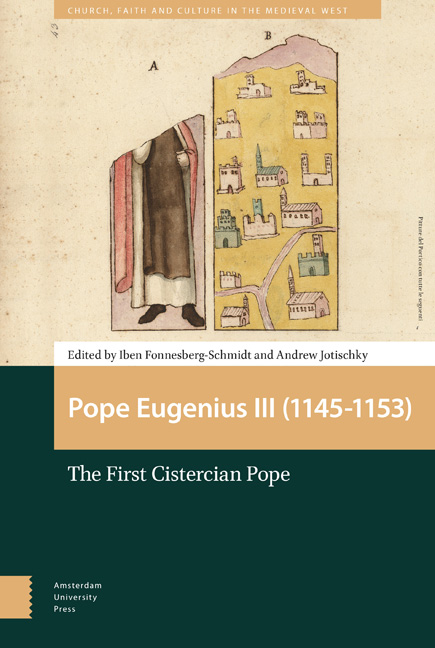Book contents
- Frontmatter
- Contents
- Preface
- Abbreviations
- Maps and Figures
- Introduction
- 1 ‘Justinian’s Laws, not the Lord’s’: Eugenius III and the Learned laws
- 2 Curial Politics and Papal Power : Eugenius III, the Curia, and Contemporary Theological Controversy
- 3 The Cistercians, Eugenius III, and the Disputed York Election
- 4 Eugenius III and the Crusades to the East
- 5 Eugenius III and the Northern Crusade
- 6 The Benefits of Exile
- 7 Eugenius III and France: the Protected Protector
- 8 A Golden Rose and the Deaf Asp that Stoppeth her Ears: Eugenius III and Spain
- 9 Eugenius III and the Roman Commune
- 10 Eugenius III Reclaims the Patrimony of St Peter
- 11 Eugenius III’s Privileges to Cistercian Houses
- 12 Eugenius III at Cîteaux, 1147
- 13 Eugenius III and the Church in the Crusader States
- Index
Introduction
Published online by Cambridge University Press: 22 December 2020
- Frontmatter
- Contents
- Preface
- Abbreviations
- Maps and Figures
- Introduction
- 1 ‘Justinian’s Laws, not the Lord’s’: Eugenius III and the Learned laws
- 2 Curial Politics and Papal Power : Eugenius III, the Curia, and Contemporary Theological Controversy
- 3 The Cistercians, Eugenius III, and the Disputed York Election
- 4 Eugenius III and the Crusades to the East
- 5 Eugenius III and the Northern Crusade
- 6 The Benefits of Exile
- 7 Eugenius III and France: the Protected Protector
- 8 A Golden Rose and the Deaf Asp that Stoppeth her Ears: Eugenius III and Spain
- 9 Eugenius III and the Roman Commune
- 10 Eugenius III Reclaims the Patrimony of St Peter
- 11 Eugenius III’s Privileges to Cistercian Houses
- 12 Eugenius III at Cîteaux, 1147
- 13 Eugenius III and the Church in the Crusader States
- Index
Summary
Pope Eugenius III was the unexpected choice of the cardinals at an election held during a period of intense crisis. His predecessor, Lucius II, died from wounds sustained when in February 1145 he led an army against the commune of Rome in order to re-establish papal control over the city. The expedition failed, and the cardinals had to withdraw to the monastery of St Caesarius to hold the election. In Bernard, who took the name Eugenius, they chose a man with a complex past. As vicedominus or episcopal representative in the archbishopric of Pisa from 1133, Eugenius had experience both as a cathedral canon and as a clerical administrator. In 1138, however, he underwent a conversion to the reformed monastic life of Clairvaux. Only two years later he was sent back to Italy to take charge of the re-foundation of the abandoned former Greek Orthodox monastery of SS. Vincenzo e Anastasio as a Cistercian house. The restoration of a ruinous monastery was a demanding task both physically and psychologically. The pioneer monks suffered from attacks of malaria, and although the restoration had been undertaken at the request of Pope Innocent II they did not enjoy the protection or support they had expected. Contrasting this difficult experience with his initial entry into Cistercian life, Eugenius looked back on his brief period at Clairvaux as time spent ‘in the midst of the trees of Paradise’.
Eugenius III's spiritual mentor, Bernard of Clairvaux, professed himself appalled at the election. The cardinals had brought ‘a man crucified’ back into the world – could they find nobody better suited to leadership than a man in hiding from the world whom they had to drag from his rustic pursuits to the papal throne? Eugenius himself appears to have shared Bernard's surprise and sense of apprehension, to judge from the letter he wrote soon after his election. Other contemporaries appeared to concur, to judge from Boso's biography in the continuation of the Liber pontificalis. No record that survives explains why the cardinals settled on Eugenius rather than, for example, the most senior cardinal and the man eventually elected in 1153 as Anastasius IV, Conrad, cardinal-bishop of Sabina, who as an experienced Roman might have been a more obvious choice in the circumstances.
- Type
- Chapter
- Information
- Pope Eugenius III (1145–1153)The First Cistercian Pope, pp. 17 - 26Publisher: Amsterdam University PressPrint publication year: 2018



